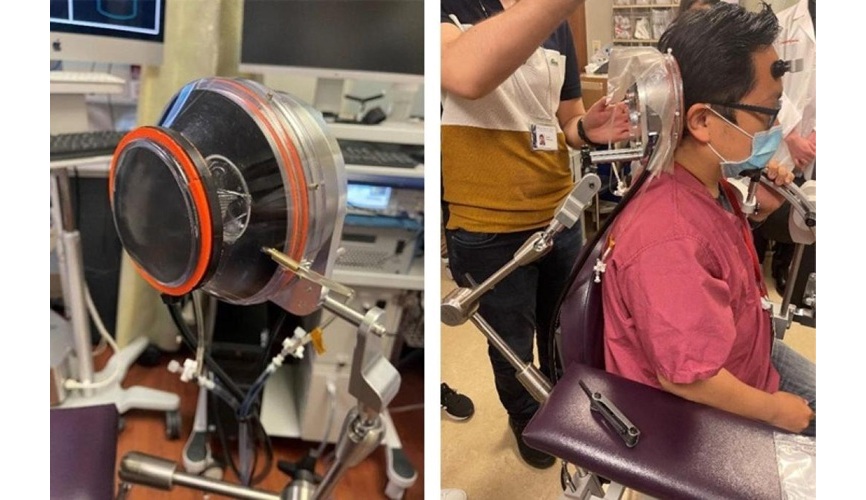Non-Invasive Technique Combines Cardiac CT with AI-Powered Blood Flow for Heart Bypass Surgery
|
By HospiMedica International staff writers Posted on 08 Apr 2024 |

Researchers have tested a new approach to the guidance, planning, and conducting of heart bypass surgery on patients for the first time, demonstrating that non-invasive cardiac CT, with AI-powered blood flow scanning, is safe and feasible.
In the FAST TRACK CABG study, overseen by a research team at the University of Galway (Galway, Ireland; ), heart surgeons planned and carried out coronary artery bypass grafting (CABG). The procedure was performed based only on non-invasive cardiac-CT scan images using GE Healthcare’s (Chicago, IL, USA) Revolution CT, along with HeartFlow, Inc.’s (Redwood City, CA, USA) AI-powered blood flow analysis of the patient’s coronary arteries. This first-of-its-kind human study demonstrated 99.1% feasibility, indicating that heart bypass surgery performed without utilizing invasive diagnostic catheterization is feasible and safe, based on good diagnostic accuracy provided by the cardiac CT scan and AI-powered blood flow analysis. The study found similar outcomes in terms of safety and effectiveness in patients who had previously undergone bypass surgery guided by conventional invasive angiography, which requires the insertion of a catheter through an artery in the wrist or groin to access diseased arteries and the use of dye to visualize blockages.
Conducted across leading cardiac care hospitals in Europe and the US, the study included 114 patients with severe coronary artery blockages, impacting their heart blood flow. The cardiac CT scans provided in the study delivered exceptional resolution, producing images on par with, or superior to, those obtained through invasive contrast dye injections directly into the heart’s arteries through a catheter. Throughout the trial, detailed cardiovascular imagery and data analyses were performed by the University of Galway team and shared via telemedicine with surgeons at participating hospitals. The HeartFlow Analysis performs an AI-powered blood flow analysis called Fractional Flow Reserve derived from CT (FFRCT) to quantify how poorly the narrowed vessel provides blood to the heart muscle, assisting the surgeon in identifying which of the patient’s vessels require a bypass graft. The FAST TRACK CABG trial's findings indicate that this innovative, less invasive approach to heart bypass surgery is as safe and effective as traditional methods. The study highlights the potential for replacing the risks associated with invasive procedures with non-invasive cardiac CT imaging and AI-based blood flow analysis, offering a significant advancement in cardiac care and surgery planning.
“The results of this trial have the potential to simplify the planning for patients undergoing heart bypass surgery,” said trial chairman Professor Patrick W Serruys, Established Professor of Interventional Medicine and Innovation at University of Galway. “The potential for surgeons to address even the most intricate cases of coronary artery disease using only a non-invasive CT scan, and FFRCT represents a monumental shift in healthcare. Following the example of the surgeon, interventional cardiologists could similarly consider circumventing traditional invasive cineangiography and instead rely solely on CT scans for procedural planning. This approach not only alleviates the diagnostic burden in cath labs but also paves the way for transforming them into dedicated ‘interventional suites’- ultimately enhancing patient workflows.”
Related Links:
University of Galway
GE Healthcare
HeartFlow, Inc.
Latest Surgical Techniques News
- Laparoscopic Surgery Improves Outcomes for Severe Newborn Liver Disease
- Novel Endoscopy Technique Provides Access to Deep Lung Tumors
- New Study Findings Could Halve Number of Stent Procedures
- Breakthrough Surgical Device Redefines Hip Arthroscopy
- Automated System Enables Real-Time "Molecular Pathology" During Cancer Surgery
- Groundbreaking Procedure Combines New Treatments for Liver Tumors
- Ablation Reduces Stroke Risk Associated with Atrial Fibrillation
- Optical Tracking Method Identifies Target Areas in Robot-Assisted Neurosurgery
- General Anesthesia Improves Post-Surgery Outcomes for Acute Stroke Patients
- Drug-Coated Balloons Can Replace Stents Even in Larger Coronary Arteries
- Magnetic Kidney Stone Retrieval Device Outperforms Ureteroscopic Laser Lithotripsy
- Absorbable Skull Device Could Replace Traditional Metal Implants Used After Brain Surgery
- Magic Silicone Liquid Powered Robots Perform MIS in Narrow Cavities
- 'Lab-on-a-Scalpel' Provides Real-Time Surgical Insights for POC Diagnostics in OR
- Biodegradable Brain Implant Prevents Glioblastoma Recurrence
- Tiny 3D Printer Reconstructs Tissues During Vocal Cord Surgery
Channels
Critical Care
view channel
Focused Ultrasound Technique Successfully Treats Pediatric Brain Cancer
Treating brain cancer in children remains one of the most difficult challenges in medicine, largely because most chemotherapy drugs cannot reach tumors deep inside the brain. A key obstacle is the blood-brain... Read more
Nasal Drops Fight Brain Tumors Noninvasively
Glioblastoma is one of the most aggressive and fatal brain cancers, progressing rapidly and leaving patients with very limited treatment options. A major challenge has been delivering effective therapies... Read more
AI Helps Optimize Therapy Selection and Dosing for Septic Shock
Septic shock is a life-threatening complication of sepsis and remains a leading cause of hospital deaths worldwide. Patients experience dangerously low blood pressure that can rapidly lead to organ failure,... Read more
Glowing Bacteria ‘Pills’ for Detecting Gut Diseases Could Eliminate Colonoscopies
Diagnosing gastrointestinal diseases such as colitis and colorectal cancer often relies on colonoscopy, an invasive procedure that many patients avoid despite ongoing symptoms like bleeding, cramping, and diarrhoea.... Read morePatient Care
view channel
Revolutionary Automatic IV-Line Flushing Device to Enhance Infusion Care
More than 80% of in-hospital patients receive intravenous (IV) therapy. Every dose of IV medicine delivered in a small volume (<250 mL) infusion bag should be followed by subsequent flushing to ensure... Read more
VR Training Tool Combats Contamination of Portable Medical Equipment
Healthcare-associated infections (HAIs) impact one in every 31 patients, cause nearly 100,000 deaths each year, and cost USD 28.4 billion in direct medical expenses. Notably, up to 75% of these infections... Read more
Portable Biosensor Platform to Reduce Hospital-Acquired Infections
Approximately 4 million patients in the European Union acquire healthcare-associated infections (HAIs) or nosocomial infections each year, with around 37,000 deaths directly resulting from these infections,... Read moreFirst-Of-Its-Kind Portable Germicidal Light Technology Disinfects High-Touch Clinical Surfaces in Seconds
Reducing healthcare-acquired infections (HAIs) remains a pressing issue within global healthcare systems. In the United States alone, 1.7 million patients contract HAIs annually, leading to approximately... Read moreHealth IT
view channel
EMR-Based Tool Predicts Graft Failure After Kidney Transplant
Kidney transplantation offers patients with end-stage kidney disease longer survival and better quality of life than dialysis, yet graft failure remains a major challenge. Although a successful transplant... Read more
Printable Molecule-Selective Nanoparticles Enable Mass Production of Wearable Biosensors
The future of medicine is likely to focus on the personalization of healthcare—understanding exactly what an individual requires and delivering the appropriate combination of nutrients, metabolites, and... Read moreBusiness
view channel
Philips and Masimo Partner to Advance Patient Monitoring Measurement Technologies
Royal Philips (Amsterdam, Netherlands) and Masimo (Irvine, California, USA) have renewed their multi-year strategic collaboration, combining Philips’ expertise in patient monitoring with Masimo’s noninvasive... Read more
B. Braun Acquires Digital Microsurgery Company True Digital Surgery
The high-end microsurgery market in neurosurgery, spine, and ENT is undergoing a significant transformation. Traditional analog microscopes are giving way to digital exoscopes, which provide improved visualization,... Read more
CMEF 2025 to Promote Holistic and High-Quality Development of Medical and Health Industry
The 92nd China International Medical Equipment Fair (CMEF 2025) Autumn Exhibition is scheduled to be held from September 26 to 29 at the China Import and Export Fair Complex (Canton Fair Complex) in Guangzhou.... Read more













